More Than Mutts: The History of North America's Earliest Dogs
Chris Widga
Wednesday, 27 Feb 2019 at 8:15 pm – Great Hall, Memorial Union
Dogs have been part of the human experience in the Old World for at least 16,000 years. But when and where do we find the earliest dogs in the Americas? Chris Widga, head curator at the East Tennessee State University Museum of Natural History, is part of an international team studying early dogs and dog domestication. Their research examining DNA recovered from several ancient animals, published in Science, has revealed the unique genetic signature of America’s first dogs, where they came from, and offered insight into their complex evolutionary history of our canine companions. Chris Widga earned his PhD in anthropology from the University of Kansas and is an adjunct professor of geosciences at East Tennessee State University.Cosponsored By:
- Anthropology
- Biomedical Sciences
- Ecology, Evolution, & Organismal Biology
- Geological and Atmospheric Sciences
- Office of the Senior Vice President and Provost
- World Languages & Cultures
- Committee on Lectures (funded by Student Government)
Stay for the entire event, including the brief question-and-answer session that follows the formal presentation. Most events run 75 minutes.
Sign-ins are after the event concludes. For lectures in the Memorial Union, go to the information desk in the Main Lounge. In other academic buildings, look for signage outside the auditorium.
Lecture Etiquette
- Stay for the entire lecture and the brief audience Q&A. If a student needs to leave early, he or she should sit near the back and exit discreetly.
- Do not bring food or uncovered drinks into the lecture.
- Check with Lectures staff before taking photographs or recording any portion of the event. There are often restrictions. Cell phones, tablets and laptops may be used to take notes or for class assignments.
- Keep questions or comments brief and concise to allow as many as possible.




